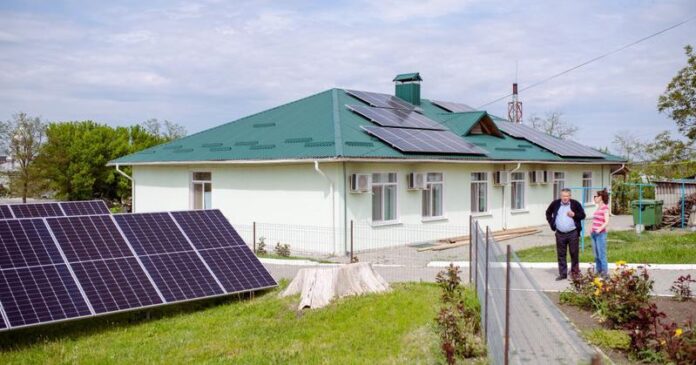Four communities in the Republic of Moldova have improved access to local public services for both residents and refugees. Solar panels have been installed at social institutions in Tudora, Mihăileni, and UTA Gagauzia, while in Cotiujenii Mari, a building housing three public institutions has undergone heating system renovation and the installation of energy-efficient windows. These interventions enhance the financial sustainability of the institutions and provide better conditions for beneficiaries.
These infrastructure optimizations were made possible with the support of multiple partners: $23,500 was provided by UNDP, $36,500 by the French Ministry for Europe and Foreign Affairs, $31,300 by the Government of the Republic of Moldova, local public administrations, residents, and the diaspora.
Life is vibrant at the “CONCORDIA” Social Center in Tudora
In the village of Tudora, Ştefan Vodă district, solar panels with a capacity of 13 kW have been installed at the “CONCORDIA” Social Center. This has resulted in a 37% reduction in electricity costs during the winter months.
“The solar panels help us tremendously because we use a lot of electricity: cooking, washing, providing multiple services to vulnerable individuals. They can take showers, wash their clothes,” says Veronica Mocan, the center’s manager.
“Our energy consumption is always high because life in our center is very diverse and intense. We organize activities for children and refugees from Ukraine, educational and art workshops, sessions with psychologists,” explains Veronica.
During the summer, up to 60 children from Tudora and neighboring villages, including refugees, participate in the center’s activities.
For elderly beneficiaries, the center’s staff organizes TV viewing and debates.
Friday is the day when both children and adults participate in gardening. “The weekly event ‘Little Gardener’ is very popular,” says the center’s manager.
The “CONCORDIA” Social Center serves approximately 600 people monthly, including refugees from Ukraine.
In addition to the beneficiaries, the center’s 13 employees also benefit from improved working conditions, as the savings obtained from reducing energy costs are redirected to cover other needs.
The Center for the Rehabilitation of Violence Survivors in UTA Gagauzia has become more energy resilient
Solar panels with a capacity of 15 kW have been installed at the Center for the Rehabilitation of Violence Survivors in UTA Gagauzia. So far, energy costs have been reduced by 30%.
“By reducing energy costs, the center has directed the savings towards improving and expanding support for families affected by violence and refugees hosted by the center,” says Svetlana Gheorghieva, the center’s director.
She remembers being greatly concerned about the energy crisis from the perspective of paying bills: “The bills used to account for about 50% of the total budget, and we couldn’t afford to save energy because we had to provide our beneficiaries with the necessary living conditions. Our beneficiaries are mostly women with young children, and if we don’t provide them with sufficient heating, one child gets sick, and the next day, all the children get sick, so saving energy is not an option,” explains Svetlana.
At the same time, with the installation of solar panels, the center’s administration no longer has to compromise between paying employees’ salaries and utility bills.
In Mihăileni, a social center confidently expands its services
In the village of Mihăileni, Rîşcani district, a solar panel system with a capacity of 10 kW has increased the energy resilience of the “Dumitru Musteaţă” multifunctional center. The center serves over 300 beneficiaries annually, including the elderly, people with disabilities, children, and vulnerable individuals. Since the beginning of the war in Ukraine, approximately 178 refugees have been accommodated in the institution in Mihăileni, and currently, the center hosts 17 refugees.
The center also functions as a social canteen, providing hot meals at home for 30 people in the village.
“In some months, we had to pay between 7,000 and 15,000 lei per month for electricity, but now, for several months, we don’t pay anything. We even have savings in the system, and we can use them later,” explains Tamara Obadă, the director of the “Dumitru Musteaţă” multifunctional center in Mihăileni.
The savings obtained will be directed towards improving the services offered by the center and its infrastructure to continue providing support to vulnerable individuals.
A public building in Cotiujenii Mari, housing 3 social institutions, has become more energy-efficient
In Cotiujenii Mari, Șoldănești district, a building hosting three public institutions (the music school, the Children’s Creation Center, and the Youth Resource Center) has undergone energy efficiency measures.
Its old heating system has been renovated, and energy-efficient windows have been installed. These interventions have led to a 40% reduction in communal service costs.
“When it rained, everything was damaged, water was leaking, and sometimes we used band-aids to cover the pipes and fix the leaks. Every time the heating season started, our workers were afraid that something bad might happen,” recalls Larisa Rîbac, the director of the “Gheorghe Urschi” music school in Cotiujenii Mari.
“Previously, we used to pay around 78,000 lei per month for heating, and we only used it for one hour a day because of the size of the building. After the system change, we can afford to maintain heating for up to 4 hours a day,” says Larisa.
Currently, the institutions hosted in the building carry out activities, including summer camps, with the participation of both locals and refugees.
Since the outbreak of the war in Ukraine, UNDP and its partners have been supporting host communities and refugees in addressing urgent needs while contributing to the socio-economic integration of refugees.
Through the implemented initiatives, support has been provided in various areas, such as facilitating access to employment opportunities, improving public service infrastructure, and strengthening social cohesion.


